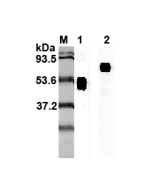Cookie Policy: This site uses cookies to improve your experience. You can find out more about our use of cookies in our Privacy Policy. By continuing to browse this site you agree to our use of cookies.
Chimerigen
IL-23 (human) (rec.)

| Product Details | |
|---|---|
| Synonyms | Interleukin-23 |
| Product Type | Protein |
| Properties | |
| Source/Host | HEK 293 cells |
| Sequence |
Human IL-12p40 peptide (aa 23-328) is fused at the C-terminus to a 18 aa linker peptide (GSTSGSGKPGSGEGSTKG) and to the IL-23p19 peptide (aa 20-189) and fused at the N-terminus to a FLAG®-tag. |
| Crossreactivity | Human |
| MW | ~70kDa (SDS-PAGE) |
| Purity | ≥95% (SDS-PAGE) |
| Endotoxin Content | <0.06EU/μg purified protein (LAL test; Lonza). |
| Reconstitution |
Reconstitute 10µg vial with 100 µl sterile water to a concentration of 0.1mg/ml. Reconstitute 50µg vial with 100 µl sterile water to a concentration of 0.5mg/ml. Add 1X PBS to the desired protein concentration. |
| Accession Number | Q9NPF7 and P29460 |
| Formulation | Lyophilized from 0.2μm-filtered solution in PBS. |
| Other Product Data |
UniProt link Q9NPF7: IL-23p19 (human) |
| Shipping and Handling | |
| Shipping | BLUE ICE |
| Short Term Storage | +4°C |
| Long Term Storage | -20°C |
| Handling Advice |
After opening, prepare aliquots and store at -20°C. Avoid freeze/thaw cycles. Centrifuge lyophilized vial before opening and reconstitution. PBS containing at least 0.1% BSA should be used for further dilutions. |
| Use/Stability |
Stable for at least 1 year after receipt when stored at -20°C. Working aliquots are stable for up to 3 months when stored at -20°C. |
| Documents | |
| MSDS |
 Download PDF Download PDF |
| Product Specification Sheet | |
| Datasheet |
 Download PDF Download PDF |
Interleukin-23 (IL-23) is a heterodimeric cytokine and a member of the IL-12 family involved in innate and adaptive immunity. It is composed of the IL-12 p40 chain covalently linked to p19, a chain related to the IL-12 p35 subunit. IL-23 signals through the IL-23 receptor complex, which is composed of the IL-12Rβ1 chain and a gp130-like chain, IL-23R. Triggering of the IL-23 receptor complex leads to the activation of Tyk2, Jak2 and STAT1, 3 and 4. IL-23 induces IFN-γ production, Th1 cell differentiation, and activation of the antigen-presenting functions of dendritic cells. IL-23 induces autoimmune inflammation and thus may be responsible for autoimmune inflammatory diseases and important for tumorigenesis.







